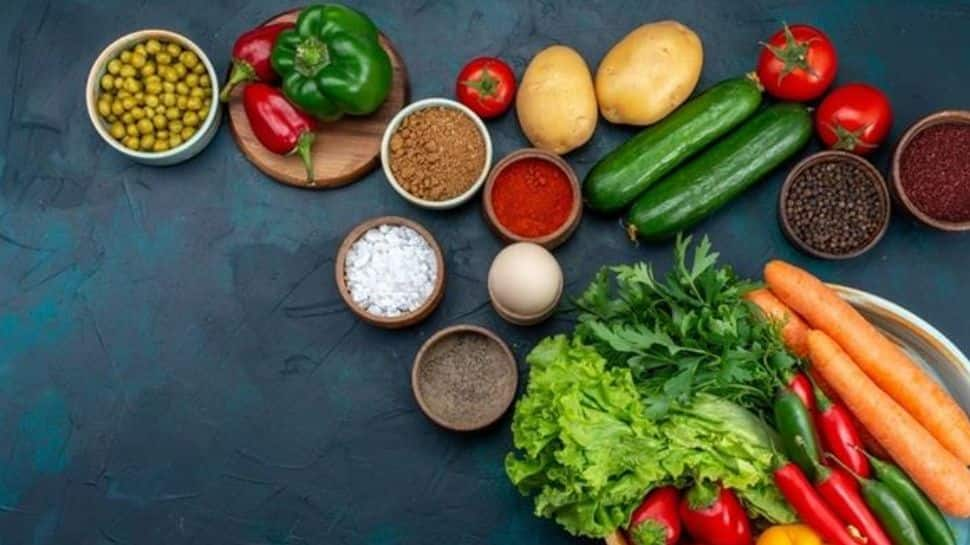Business
Indias Organic Food Market To Grow At A CAGR Of 20.13% To USD 10,807 Million By 2033: Experts

New Delhi: India’s food processing sector today stands as a vital pillar of the economy, contributing 7.7% to the country’s manufacturing output and providing livelihoods to more than seven million people. Valued at USD 535 billion by 2025–26, the industry is being propelled by rising domestic consumption, growing exports, and government initiatives under the ‘Make in India’ programme. Within this ecosystem, the food ingredients market alone is expanding at a healthy CAGR of 7–8%.
With artificial intelligence, automation, and smart packaging reshaping the way food is processed and delivered, India is positioning itself as a potential global hub for food products, packaging materials, and machinery. Experts highlighted that consumers today are ready to pay a premium for quality organic foods as health awareness is taking centrestage in people’s lives.
Speaking at the 19th edition of Fi India co-located with 7th edition of ProPak India, Yogesh Mudras, Managing Director, Informa Markets in India, said “The Indian food processing sector is undergoing a transformative phase, driven by rising health consciousness, growing preference for organic and plant-based foods, and a notable shift in dietary patterns. With the organic food market projected to touch Rs 75,000 crore by 2025, and a majority of consumers willing to pay a premium for healthier alternatives, the industry is seeing rapid expansion across fruits, vegetables, and plant-based offerings.”
Experts said that food ingredients form the backbone of the food sector, with packaging playing an equally critical role in ensuring safety and quality. Dr. Meenakshi Singh, Chief Scientist, Technology Management Directorate, Council of Scientific & Industrial Research (CSIR), said “Supported by schemes like the Production Linked Incentive (PLI), the industry is witnessing strong growth. CSIR, through its 37 R&D labs nationwide including scientific testing labs and those focused on food ingredients, continues to drive innovation in food ingredients and packaging, while FSSAI has mandated safety checks, placing responsibility on all stakeholders to ensure compliance. In 2025, FSSAI’s focus on stricter labeling, organic food standards, and consumer awareness is shaping industry practices at a time when India’s organic food market has already reached USD 1,917 million in 2024 and is projected to grow at a CAGR of 20.13% to USD 10,807 million by 2033.”
Strengthening food processing is critical, as it directly enhances farmer incomes-supporting nearly 68% of India’s population-and adds value through exports, said the experts. Ingredients such as turmeric, exemplify the dual role of Indian spices in promoting both taste and health, contributing to lower rates of mortality during Covid and neurological disorders compared to global averages.
Dr. Prabodh Halde, Chairman, Chamber for Advancement of Small and Medium Businesses (CASMB), said, “India’s food processing and ingredient industry holds immense strategic importance in the current global geopolitical scenario, with the market already valued at $8-9 billion and steadily expanding. Growth is being driven by Ayurveda, herbal, organic products.”
India’s food processing industry today stands as one of the largest globally, accounting for 32% of the nation’s total food market. It contributes nearly 14% of manufacturing GDP, 13% of exports, and 6% of total industrial investments, highlighting its pivotal role in the economy. According to a Deloitte-FICCI report, the sector contributes 7.7% to India’s overall manufacturing output while supporting more than 7 million jobs directly and indirectly. Beyond its economic weight, the industry is instrumental in driving rural industrialisation, reducing post-harvest losses, and positioning India as a key hub for processed and value-added food products on the global stage.
Business
Volkswagen capex recalibration: Automaker pares 2030 investment to $186 bn; China, US headwinds grow – The Times of India

Volkswagen Group plans to invest €160 billion ($186 billion) through 2030, a scaled-down outlay that reflects tightening capital allocation as Europe’s largest automaker grapples with mounting pressure in its two biggest markets — China and the United States, Reuters reported.The investment figure, announced by Volkswagen CEO Oliver Blume, is part of the company’s rolling five-year capital expenditure plan, which is updated annually. The latest commitment compares with €165 billion earmarked for 2025–2029 and €180 billion for 2024–2028, with 2024 marking the peak year for spending.Since that peak, the group — which houses brands such as Porsche and Audi — has been squeezed by higher costs and weaker margins, hit by US tariffs on imported vehicles and intensifying competition in China. The strain has been felt most acutely at Porsche, which derives nearly half of its sales from the US and China combined.Porsche recently unveiled a significant rollback of its electric vehicle strategy as profits came under pressure. Speaking to Frankfurter Allgemeine Sonntagszeitung, Blume said the focus of the latest investment plan was firmly “on Germany and Europe,” particularly in products, technology and infrastructure.Blume added that discussions on an extended savings programme at Porsche are expected to continue into 2026. He also said he does not expect Porsche to grow in China, though localising production across the wider Volkswagen group remains an option. A China-specific Porsche model could make sense at some point, he said.On Audi, Blume noted that any decision on building a manufacturing plant in the United States would depend on whether Washington offers substantial financial support.Blume, who will step down as Porsche CEO in January to concentrate fully on running Volkswagen Group, said his recent contract extension as Volkswagen chief executive until 2030 signalled continued backing from the Porsche and Piëch families as well as the German state of Lower Saxony, the company’s largest shareholders.“But it is true, of course, that shareholders have suffered losses since Porsche went public three years ago. I, too, must face up to this criticism,” he said.
Business
From the California gold rush to Sydney Sweeney: How denim became the most enduring garment in American fashion

Jodie Foster, Billie Perkins, and Robert De Niro perform a scene in Taxi Driver directed by Martin Scorsese in 1976 in New York, New York.
Michael Ochs Archives | Moviepix | Getty Images
In the dwindling days of the California gold rush, the wife of a local miner faced a problem.
Her husband’s denim work pants kept ripping, so her tailor, Jacob Davis, had the idea to add copper rivets to key points of strain, like the pocket corners and the base of the button fly, to keep them from tearing.
Davis’ “riveted pants” soon became a roaring success and, unbeknownst to him at the time, marked the official birth of the blue jean, a garment that would transform fashion and come to represent the United States around the globe.
“It really has democratized American fashion and it also is the greatest export that we have sent to the world, because people identify jeans specifically with American Western culture,” said Shawn Grain Carter, a fashion professor at the Fashion Institute of Technology in New York. “It doesn’t matter your economic or social class. It doesn’t matter what your views are in terms of the political spectrum. Everybody wears denim.”
Jacob Davis
Courtesy: Levi Strauss & Co.
These days, denim is a major sales driver for retailers big and small, as the global denim market reached $101 billion this year, up 28% from 2020, according to data from market research company Euromonitor International. Major apparel companies from American Eagle to Levi Strauss are in a race to corner that market, leaning on A-list celebrities like Sydney Sweeney and Beyonce to win over shoppers and drive sales in an unsteady economy.
But if it weren’t for Levi Strauss, founder of the eponymous blue jeans company, Davis’ invention may not have gone far beyond the railroad town where it was created in the early 1870s.
How Levi’s created blue jeans
Soon after Davis created his riveted pants, called “waist overalls” or “overalls” at the time, they began selling like “hot cakes” and he needed a business partner to secure a patent, said Tracey Panek, Levi’s in-house historian. So he wrote to Strauss, a Bavarian-born immigrant who was running a successful wholesale business in San Francisco and had supplied Davis the denim he used to create his riveted pants.
“The secret of them Pents is the Rivits that I put in those Pockets and I found the demand so large that I cannot make them up fast enough,” Davis wrote Strauss in a letter, according to PBS.
Levi Strauss
Courtesy: Levi Strauss & Co.
Strauss, an “astute” businessman, recognized the opportunity and agreed to partner with Davis, said Panek.
“This would have been the first time that Levi was actually” manufacturing his own products, said Panek. “He was no longer just importing and selling other people’s goods. He was manufacturing himself and selling to retailers.”
On May 20, 1873, the two men secured a patent for the riveted pants and eventually opened a factory on Fremont Street, close to the modern-day Salesforce tower in San Francisco’s financial district.
They promised to offer workers the most durable jeans on the market and soon, business was booming.
Dude ranch duds and the American worker
Through Strauss’ connections as a wholesaler, the company’s riveted overalls soon spread across the U.S., becoming the garment of choice for working men everywhere: miners, cowboys, farmers – any role that required durable clothing.
Jeans were exclusively reserved for work settings at the time, but as emerging denim manufacturers vied for a similar customer base, they looked to expand their assortment to drive sales.
“Slowly and steadily into the 20th century, you start to see some of these manufacturers making variations,” said Sonya Abrego, a New York City-based fashion historian. “There was this one design called spring bottom pants that was kind of a more form fitted, a more dressed up, a slightly flared, maybe what the factory foreman would be wearing, right? As opposed to just the guy on the shop floor.”
In 1934, Levi created the first ever line of jeans for women. Around that time, denim started to become more popular in settings outside of work, primarily for activities like dude ranch vacations, camping and horseback riding.
“So they were kind of taking on a cowboy’s garment or a worker’s garment but wearing it in a … resort setting,” said Abrego.
Courtesy: Levi Strauss & Co.
Dude ranch vacations had become popular because there were finally highways connecting different parts of the country, and few were willing to venture to Europe during a war. Companies like Levi began releasing advertisements highlighting their denim as “dude ranch duds” and “authentic western riding wear” to capture shoppers looking for jeans to bring with them on vacation, according to archival advertisements from the time.
These cultural moments helped to expand denim beyond workers, but jeans didn’t become widespread casual attire until after World War II, when American fashion overall started to shift.
The rise of the backyard BBQ
By the time World War II ended, the mighty American consumer was beginning to emerge. For years, Americans had been forced to ration common goods like rubber, sugar and meat while simultaneously being encouraged to save their money by buying war bonds and socking away spare cash.
When the country shifted from wartime to peacetime, Americans were ready to splurge and soon began spending big on new cars, appliances and clothes.
“With a little bit more money to spend, you start seeing a bigger push for leisure clothes and fun clothes and play clothes, clothes to wear to backyard barbecues,” said Abrego. “Clothes that we would consider today as just like casual style.”
Courtesy: Levi Strauss & Co.
Slowly and surely, it became more and more acceptable for both men and women to wear jeans outside of work settings. Then, denim manufacturers made a push to allow jeans in schools.
“They wanted to sell to as many people as they possibly could,” said Abrego. “The idea that jeans are good for school means that they’re good for every day.”
By the time the 1960s hit, denim manufacturers had expanded their products and were selling a wide variety of colors, fits and styles. It became a symbol of the hippie movement and a mainstay on Hollywood sets.
Soon, denim was everywhere, and the 1970s brought the iconic bell bottom pants and the first iteration of the “designer jean” — denim pants being produced by labels and brands whose designs had nothing to do with work wear or western wear, like Calvin Klein and Gloria Vanderbilt.
Since then, denim has remained a constant in global fashion. While silhouettes, washes and fits have changed over time, jeans never really go out of style, which is what makes them so enduring, said Abrego.
“This is a design from 1873 … do we see anything else from 1873 on the street? It’s kind of wild if you think about it that way,” said Abrego. “We can talk about all the details, all the changes in manufacturing and all the different fits and finishes but it’s a recognizable thing, it’s still a pair of jeans. For me as a historian, that continuity is so compelling because I can’t really name anything else that has stayed the same to this degree.”
Business
Power as ‘currency’: Experts say data centre growth lifts demand; India poised for global leadership – The Times of India

India’s expanding data centre and artificial intelligence ecosystem could position the country as a global leader in power trade, with experts pointing to surplus electricity capacity and rapid reforms in the power distribution sector, according to speakers at a national conference on energy and technology.Speaking at the National Conference on AI and Machine Learning based solutions in the power sector, Jitendra Srivastava, chairman and managing director of REC Limited, said the rapid rise of AI and data centres is creating a new era where electricity itself becomes a strategic asset, according to ANI.“With the exploding growth of artificial intelligence, with the exploding growth of data centres, with the sheer amount of power required to function these places…We are going to see an era when power will be the currency and we are uniquely placed with its huge potential with its already surplus status. We are poised to become world leaders. We are in a position where we can show the world that power is a tradable commodity and we can be global leaders in this,” Srivastava said.The conference brought together solution providers and power distribution companies with the aim of enabling collaboration and innovation. Shashank Mishra, Joint Secretary in the Ministry of Power, said the initiative was designed to create a common platform for developing new solutions.“Today we are bringing together solution providers and distribution companies on a single platform where they can interact and develop new solutions and ideas. We are also presenting several innovative concepts in the form of solutions, and the best among them will be awarded by the Minister of Power,” Mishra told ANI.He added that the government expects the initiative to be “a transformative” step for the sector.Highlighting ongoing reforms, Srivastava said the Ministry of Power has been driving changes under the Revamped Distribution Sector Scheme (RDSS), with smart metering forming a core pillar of the programme. He stressed that the benefits of smart meters can be fully realised only with the use of advanced analytics.“To understand the advantages of smart metering, it is essential to leverage the power of artificial intelligence and machine learning,” he said, adding that such tools can aid anti-theft measures, load forecasting and system rationalisation.According to Srivastava, the conference seeks to demonstrate how AI- and machine learning-based tools can improve consumer services, assist electricity regulators and help discoms function more efficiently.India’s energy sector has strengthened significantly in recent years, balancing rising demand with sustainability goals. Citing International Energy Agency projections, speakers noted that emerging and developing economies will account for about 85 per cent of the growth in global electricity demand over the next three years, with India playing a central role.As of June 2025, India’s total installed power capacity stood at 476 GW, while power shortages have declined sharply from 4.2 per cent in 2013-14 to 0.1 per cent in 2024-25, according to official data.
-

 Tech6 days ago
Tech6 days agoGet Your Steps In From Your Home Office With This Walking Pad—On Sale This Week
-

 Sports6 days ago
Sports6 days agoIndia Triumphs Over South Africa in First ODI Thanks to Kohli’s Heroics – SUCH TV
-

 Entertainment6 days ago
Entertainment6 days agoSadie Sink talks about the future of Max in ‘Stranger Things’
-

 Fashion6 days ago
Fashion6 days agoResults are in: US Black Friday store visits down, e-visits up, apparel shines
-

 Politics6 days ago
Politics6 days agoElon Musk reveals partner’s half-Indian roots, son’s middle name ‘Sekhar’
-

 Tech6 days ago
Tech6 days agoPrague’s City Center Sparkles, Buzzes, and Burns at the Signal Festival
-

 Sports6 days ago
Sports6 days agoBroncos secure thrilling OT victory over Commanders behind clutch performances
-

 Sports6 days ago
Sports6 days agoF1 set for final-race showdown as Verstappen exploits McLaren blunder | The Express Tribune






